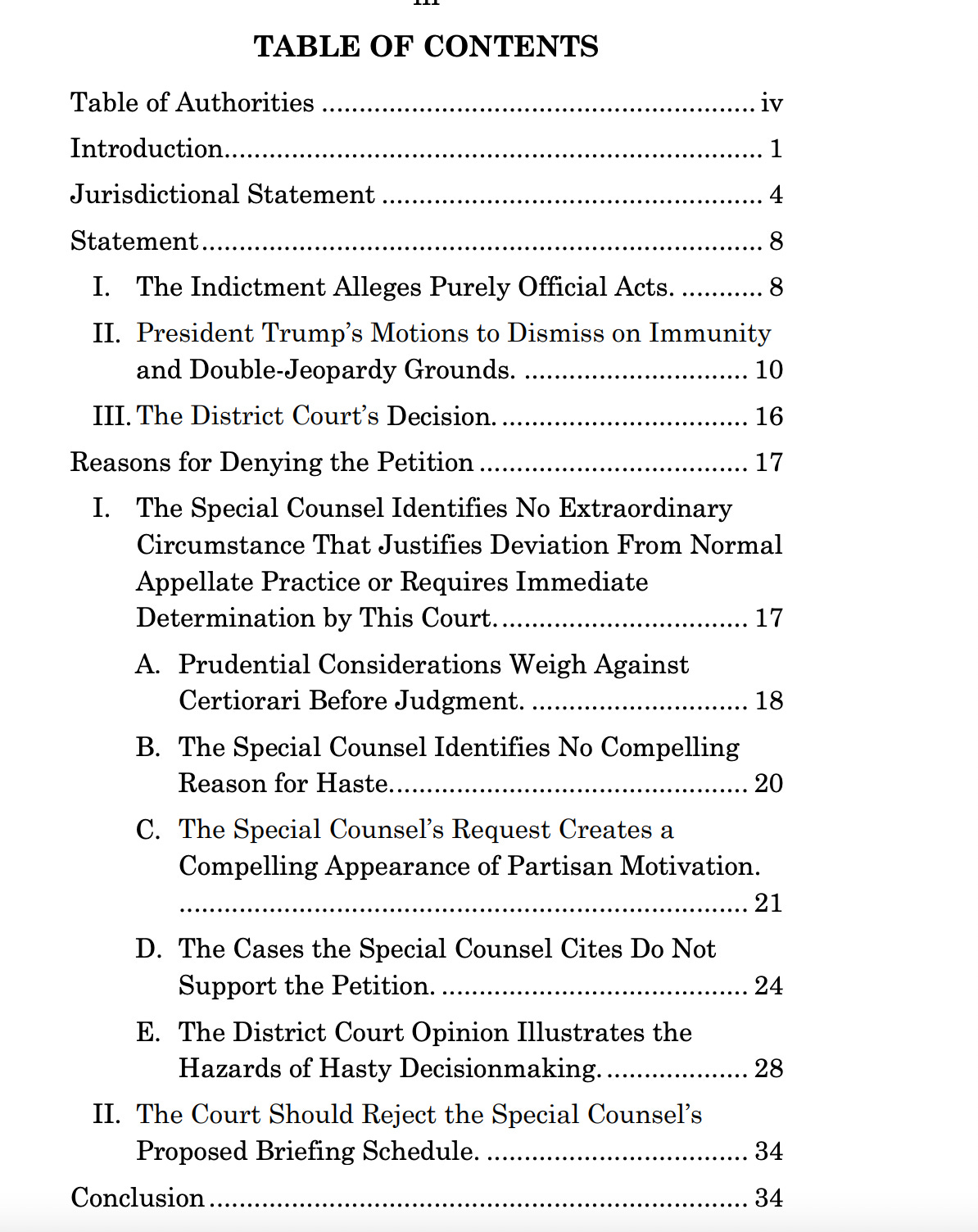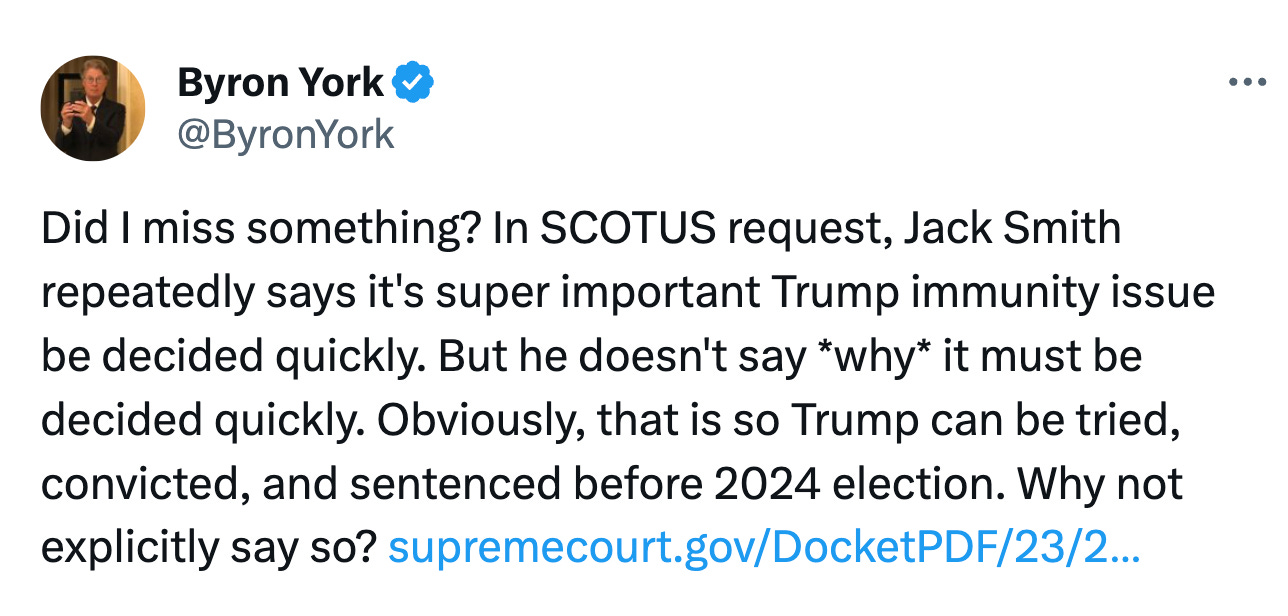Today, Donald Trump filed his “BRIEF IN OPPOSITION TO PETITION FOR WRIT OF CERTIORARI BEFORE JUDGMENT” in the Supreme Court of the United States. At this stage, the Court is being asked to take this appeal out of order, before the D.C. Court of Appeals considers whether Judge Chutkan got it right when she ruled against Trump’s motions to dismiss the indictment on presidential immunity and double jeopardy grounds. In other words, this is a procedural decision about whether the Court should hear the case now, not a substantive decision about the merits. That will come next if the Court agrees to take the case out of the hands of the Court of Appeals.
You can read Trump’s brief here.
I’m a fan of using the table of contents that court rules require litigants to include in their briefs as a guide to the arguments they’re making. It’s helpful here.
I’m sure the lawyer who wrote “the district court opinion illustrates the hazards of hasty decision making” as though he was delivering a cautionary tale to the Justices, was pleased with his clever turn of phrase. But ultimately, the cuteness and the conclusory suggestion that the “Special Counsel identifies no compelling reason for haste” when the defendant, a potential presidential candidate, is the party who has filed these motions and asked for the indictment against him to be dismissed, falls flat. It’s as though Trump says to the Court, “Yes, your honors, I’m under indictment and I’ve asked you to dismiss the charges as legally meritless, but there’s no hurry. Please take your time, lots of it.” Stepping back and looking at this through that lens, Trump’s position is a little ridiculous. More than a little.
Trump opens by arguing that the case “presents a fundamental question at the heart of our democracy … whether a President may be criminally prosecuted for his official acts. The ‘paramount public importance’ of that question … calls for it to be resolved in a cautious, deliberative manner—not at breakneck speed.” Of course, Jack Smith isn’t calling for breakneck speed, he’s calling for the Supreme Court to let the matter skip the Court of Appeals and go directly to the Supreme Court, since in Smith’s estimation, it will have to be decided there anyhow. It’s clear from Trump’s argument that the speed he’s concerned with is the speed with which the case gets to trial, and he wants to lengthen the appeal process to put that off for as long as possible.
Trump also trots out the same argument he made in the district court, one we’ve already debunked. “In 234 years of American history, no President ever faced criminal prosecution for his official acts,” his lawyers write in their brief. That, of course, is not a fair criticism of the prosecution. It simply reflects that Trump is the first president in those 234 years to try to interfere with the transfer of power following an election. It’s not the point in Trump’s favor that his lawyers seem to think it is.
But Trump’s lawyers use that mischaracterization to suggest that the immunity question needs to marinate more in the stew of the appellate process before it will be ripe for decision. They write, “The question stands among the most complex, intricate, and momentous issues that this Court will be called on to decide.” It’s fair to call the issue momentous, because of the impact it will have on the country. It’s interesting that they concede the Supreme Court must ultimately decide the issue—that would seem to tilt the scales in favor of Jack Smith’s, “why wait?” argument. But it’s the “complex” and “intricate” part of the argument that rings less true to me.
Trump’s lawyers are correct that no court has ever had to decide if a former president is immune from prosecution for criminal conduct committed while in office. But immunity issues themselves are frequently litigated, even as they apply to presidents. It was just this past Monday, in the context of a civil matter, that the 11th Circuit drew a distinction between conduct committed by Mark Meadows in the course of his official duties for President Trump and conduct associated with the campaign of candidate Trump. And although Trump appears to resist that characterization, arguing here that everything Jack Smith has charged him with was done as part of the “outer perimeter” of his official duties, it seems to me that the lower courts have threshed the issues, and ultimately, whether now or later, the Supreme Court will simply have to weigh in and decide them. That, after all, is their job.
Trump’s lawyers correctly point out that the Court of Appeals has set an expedited briefing schedule that will have them hearing argument on January 9 and presumably deciding the case in the following weeks if not days. The Supreme Court will have to decide whether there is sufficient benefit to letting the case follow that path, continuing to tick time off of the clock with a March trial date, and more importantly, a February start date for jury selection, on hold during the pendency of the appeal. Trump’s lawyers say there’s no need for speed, that it’s all just part of Joe Biden’s political witch hunt. They argue for “granting this Court the benefit of an appellate court’s prior consideration of these historic topics and performing the traditional winnowing function that this Court has long preferred.” And yet, a grand jury heard the government’s evidence and found independently that there was probable cause for the case to proceed, and a federal judge has now heard much of the pretrial argument. If ever there was a moment for the Supreme Court to stand up for the rule of law, this would be it. Refusing to sanction Trump’s ploy for additional, meritless delay would set the standard.
But I think it’s hard to predict which way they’ll go here. Trump’s arguments aren’t frivolous. We may not like them or think they are ultimately winners, but the Court will give them serious consideration. The question is whether there are five Justices who will buy one or more of them and send the case to the Court of Appeals for first crack at a ruling.
The bottom line issue is whether there is a manifest public interest in seeing the case tried before the election. Trump’s lawyers say no. Jack Smith says yes. And it seems to me—as a voter—that I’d like to know how a jury comes out on that one before I cast my vote in November. Trump isn’t an alderman charged with petty theft. He’s a former president, charged with conspiring to interfere with the transfer of power after he lost the last election, who is now seeking to return to power. Trump says this amounts to nothing more than “vague references to the supposed ‘paramount public importance’ of holding President Trump’s potential criminal trial ‘as expeditiously as possible,’” and perhaps that position will attract some support on the Court. But there seems to be every reason to avoid unnecessary delay in this matter, and since Trump agrees with Jack Smith that the Supreme Court must ultimately decide the case, it would be a fair assessment for the Court to take the case now.
One final note, the tone of Trump’s brief is far more snide that what you typically see in appellate argument, and probably far less combative than what Trump would have liked, particularly when they argue that the prosecution is a political attack. Letting the client dictate the arguments that make it into a brief can damage the arguments overall credibility, and there’s some sense that happens here.
It’s not often you see lawyers relying on political pundits instead of legal authority to prove their points, but it occurs here. Trump’s lawyers write, “As soon as the Special Counsel’s petition was filed, commentators from across the political spectrum observed that its evident motivation is to schedule the trial before the 2024 presidential election—a nakedly political motive.” They cite a number of pundits, including opinions such as this Byron York tweet, as though their reasoning is authoritative. York’s Twitter bio identifies him as, “Chief political correspondent, Washington Examiner. Fox News contributor. Host of ‘The Byron York Show' podcast.”
If it’s in a Tweet, it must be a good argument for the Supreme Court to buy into, or so thinks Trump.
Of course, we all know why it matters for this case to be tried without undue delay. Let’s hope the Court, or at least a majority of the Court, does too, and is willing to put a halt to Trump’s games. It’s odd to have Trump telling the Court to take more time to decide motions he himself brought to dismiss the case, almost as though he’s aware they are lacking in merit and are only interposed for purposes of delay. The Court of Appeals in the District of Columbia has just ruled against him in another immunity matter which, while noting it doesn’t decide the criminal immunity issue, suggests by analogy that the ruling in a criminal case will be no different. Why wouldn’t Trump want to jump straight to the Supreme Court, a Court with a conservative majority that includes three Justices he appointed during his time in office, unless delay was his goal? His arguments here ring hollow and the public has a legitimate interest in a speedy trial. Ultimately that’s an important consideration here. Trump has been permitted to delay the legal proceedings against him for long enough.
We’re in this together,
Joyce






Thank you, Joyce, for explaining these chess moves to us. Article 6, second paragraph is pretty clear. "This Constitution, and all laws of the United States which shall be made in pursuance thereof; and all treaties made, or which shall be made, under the authority of the United States, shall be the supreme law of the land;" If we were to accept the Donald John Trump is immune from prosecution for his crimes, then we are placing him above the 'supreme law of the land'. But we, as a nation have held that no man is above the law. We cannot prosecute someone with "diplomatic immunity", so I suppose Trump could claim that as an agent of Putin he has diplomatic immunity - but he forgot to register as an agent of a foreign government, oops!
It seems to me that SCOTUS has not at all bent over backwards for Trump regarding the 2020 election. They ruled against him, and/or refused to hear his appeals in some of the 60 cases he lost in the courts after the election and before 1/6/2021. I can’t imagine they’d be solicitous now. They have his number. I’m hoping they take the case on an expedited basis. Keeping my fingers crossed.